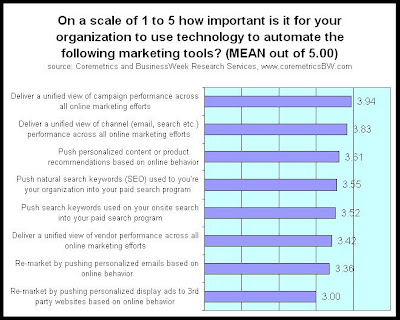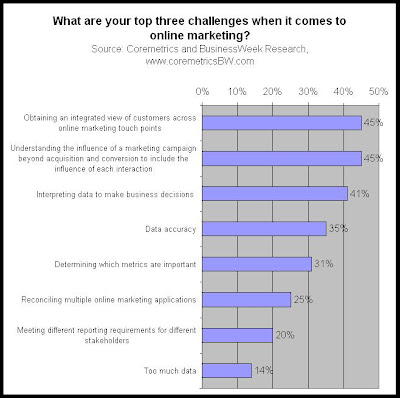I was debating yet another post on database vs digital marketing when I saw a Direct Newsline headline that said “Online Marketers Talk The Talk, But Don't Walk The Walk”. The accompanying article suggested the online marketers don’t give personalization a high priority, which supports the theme of my last few posts. Sweet.
But reality proves a bit more complex.
The article referred to a survey of online marketers sponsored by Web analytics vendor Coremetrics. As the headline suggests, about three-quarters of the marketers listed personalized email, display advertising and onsite pages as a high priority, but just under half are actually using them. So, yes, there’s more talking than walking.

But a closer look* shows that the “future priority” numbers are also related to current deployment: items like basic email marketing have low future priority scores because they’re already in widespread use. So the apparent discrepancy in the personalization rankings is less because online marketers don’t really care about it, than because they’ve had other, more fundamental things to do first.
If I were feeling particularly tendentious, I could argue other data in survey supports my claim that digital marketers are relatively disinterested in personalization. For example, “manual onsite cross-selling promotions and product recommendations” has a higher deployment rate (63%) than “manual onsite personalized content and recommendations” (49%). But a simpler explanation is that personalized recommendations are just technically harder. Indeed, the two “technology-driven” options, recommendations based on individual behavior and on “wisdom of the clouds”, have the lowest of all current deployment rates.
That said, it’s still interesting that the survey shows personalized email (52% deployed) as not significantly more common than personalized advertising (50%) or personalized site content (49%). This seems to contradict my position: if email is run by personalization-oriented database marketers, while Web advertising and (perhaps) site content are run by behavioral-targeting-oriented digital marketers, then email personalization should be more common.
But the actual question asks about email, display advertising and onsite content which are personalized "based on individual online behavior”. This adds the additional constraint of whether marketers have been able to tie (mostly anonymous) online behavior to other channels. That constraint applies across all the delivery channels, and is likely why the deployment rates are so similar. Surely the vast majority marketers are personalizing their email using information in their databases, particularly if you extend the definition of "personalization" to include segmentation that determines which messages are sent to whom.
A separate question asked marketers to rate the importance of automating different marketing tools.

What's interesting about those answers is that five of the top six didn't involve individual-level data: three are about campaign, channel and vendor performance, and the other two are about search keywords in aggregate. The only exception, "personalized content or product recommendations based on online behavior" is based on reusing data within a single channel, which means that individuals need not be personally identified. (The survey makes clear that its definition of "personalization" includes treatments based on anonymous behavior tracking.) Actually, the two applications that do rely on consolidating personal data across channels are the lowest ranked of all the options presented. I'd say this supports my fundamental contention that digital marketers are mostly concerned about non-personal, channel-specific applications.
On the other hand, respondents did rate “obtaining an integrated view of customers across online marketing touch points” as their highest challenge, or at least as a tie with measuring marketing impact. Since it was only listed by 45% of the respondents, I could speculate that those might have been the database (email) marketers in the group, while the digital (Web) marketers could have all ignored it.
But I’m not inclined to bother: I have no problem believing that digital marketers are perfectly willing, even eager, to consolidate data across channels when it’s possible. My main point is consolidation is generally not possible because most digital touchpoints do not collect identifiable, addressable information. (See yesterdays’ post for my definitions of those terms.) And, because consolidated data is often not available, the digital marketers have learned to work without it.

By contrast, Coremetrics is focused on a future (or, perhaps, imaginary) world where data-gathering techniques have improved. Coremetrics is arguing, and I fully agree, that consolidating data across channels does add value and that marketers should be willing to invest in making it happen.
In fact, if I hadn’t seen the survey this morning, my intent was to write about the convergence of database and digital marketing, precisely because digital marketers are increasingly aware of the value and possibilities of working from a consolidated database. So even though I’ve been arguing that database and digital marketing today are quite different, I do think they’ll become more similar over time as each group learns from the other. The marketers themselves are already leading in that direction, and vendors who want to survive will surely follow.
______________________________________________
* very close indeed. Sorry for the small print in the charts. It's the best I could do. The actual data is available in the surveys.


2 comments:
David, agree that today leveraging this data when it is so disjointed is a challenge. For most the effort won't be worth the return (at this time). But I see it as a potential opportunity if the vendors can get it right. By 'right' I mean providing the information in a way that makes the data easier to actionably consolidate. And this may not be entirely possible given the variables of anonymous/known participation, various platforms (mobile/desktop), and the way digital profiles (cookies and ip addresses, for example).
For now, I see marketers attempting to string this information together by encouraging their audience to identify across channels. For example, encouraging your Twitter audience to participate in an offline meetup, where you have a chance to tie the Twitter handle to the person's contact information (tactics will vary based on audience, and B2B vs B2C).
In your opinion is there "one to watch" as a leader in driving this vision of a consolidated data view, or has no vendor separated themselves from the pack at this time?
Hi Mark,
I think Coremetrics has made the biggest point of talking about consolidated profiles, at least among Web analytics vendors. But pretty much all the major marketing automation vendors (Unica, Alterian, SAS, Teradata) have invested substantially in this area, as have some of the data providers (Acxiom, TARGUSinfo). But I don't think any one firm has truly separated itself from the pack.
Post a Comment